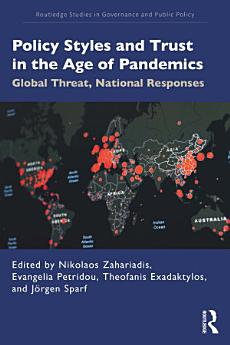Policy Styles and Trust in the Age of Pandemics: Global Threat, National Responses
About this ebook
Despite governments being faced with the same threat, significant variation in national responses, frequently of contradictory nature, has been observed. Implications about responses inform a broader class of crises beyond this specific context. The authors argue that trust in government interacts with policy styles resulting in different responses and that the acute turbulence, uncertainty, and urgency of crises complicate the ability of policymakers to make sense of the problem. Finally, the book posits that unless there is high trust between society and the state, a decentralized response will likely be disastrous and concludes that while national responses to crises aim to save lives, they also serve to project political power and protect the status quo.
This text will be of key interest to scholars and students of public policy, public administration, political science, sociology, public health, and crisis management/disaster management studies.
About the author
Nikolaos Zahariadis is Mertie Buckman Chair and Professor of International Studies at Rhodes College, USA.
Evangelia Petridou is Associate Professor of Political Science at Mid Sweden University, Sweden.
Theofanis Exadaktylos is Reader in European Politics at the Department of Politics, University of Surrey, UK.
Jörgen Sparf is Associate Professor in Sociology and a founding member of the Risk and Crisis Research Centre at Mid Sweden University, Sweden.






